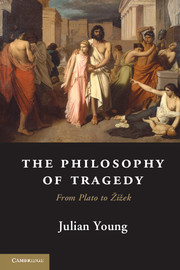Book contents
3 - After Aristotle
Published online by Cambridge University Press: 05 June 2013
Summary
HORACE, CASTELVETRO AND RAPIN
After Aristotle, no major philosopher theorised about tragedy until Hume in the eighteenth century. No major, or even relatively major, philosopher wrote a treatise on tragedy during this two-millennium period. This is not to say that there was no theorising about tragedy. As I shall now briefly suggest, however, none of it rises to the level of philosophy.
Horace (65 BCE–8 BCE) wrote, in verse form, a charming, amusing and often satirical Ars Poetica, in which he sets out a number of rules for achieving the goal of tragedy. Officially he identifies this goal as the speaking of words that are both ‘pleasing and useful for our lives’. But since there is no serious discussion as to why tragedy might be thought to possess utility – the reference is hardly more than lip-service – de facto, the end of tragedy is, for Horace, entertainment. Given, then, the observation in my Introduction that the philosophy of tragedy is essentially concerned with the nature of its telos, with the tragic effect, Horace’s treatise is not to be regarded as philosophy of tragedy.
- Type
- Chapter
- Information
- The Philosophy of TragedyFrom Plato to Žižek, pp. 41 - 57Publisher: Cambridge University PressPrint publication year: 2013

